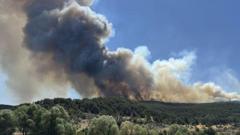Smoke from extensive wildfires in Canada has led to an air quality advisory for New York and nearby regions, warning sensitive groups of potential health risks as pollution levels rise.**
Wildfire Smoke from Canada Triggers Air Quality Alerts in New York**

Wildfire Smoke from Canada Triggers Air Quality Alerts in New York**
New York City and surrounding areas experience unhealthy air conditions due to Canadian wildfires, prompting health advisories.**
Smoke from relentless wildfires in Canada has triggered an air quality health advisory across New York City and its surrounding regions this weekend. The New York State Department of Environmental Conservation (DEC) and Department of Health (DOH) shared this alert on X (formerly Twitter), indicating that areas such as Long Island, the New York City Metro area, Lower Hudson Valley, Upper Hudson Valley, and the Adirondacks are now facing air quality levels deemed "unhealthy for sensitive groups."
The ongoing wildfires have displaced tens of thousands of Canadians, sending thick smoke drifting across the northern United States and raising concerns over air quality. Predictions suggested that much of New York State could see Air Quality Index (AQI) readings above 100, with possible spikes reaching 135. Alerts have similarly been issued for certain regions within New England, as well.
The AQI serves as a measure of air pollution severity, correlating a higher index value with increased health risks. This situation marks another instance where authorities in the U.S. have had to respond to the adverse effects of Canadian wildfire smoke; a similar alert was issued for Chicago just weeks earlier, highlighting the need for precautionary measures, especially for vulnerable populations like infants and seniors.
Political ramifications of the wildfire smoke have also made headlines. Earlier in July, six members of Congress formally expressed their concerns to the Canadian ambassador regarding the smoke's impact on Americans' summer experiences.
As the situation unfolds, over 550 active wildfires continue to rage in Canada, predominantly in the province of Manitoba. In total, authorities report that 6.1 million hectares (approximately 15 million acres) of land have been scorched nationwide this past year. May and June proved to be particularly devastating, leading to mass evacuations in Saskatchewan and Manitoba, where local governments have since declared states of emergency.
Scientific consensus links the intensification of wildfire seasons to climate change, with studies showing that Canada is warming at a rate approximately double that of the global average and its Arctic regions seeing almost triple the increase. As authorities brace for continued impacts, air quality alerts remain a pressing issue in both Canada and the United States.



















